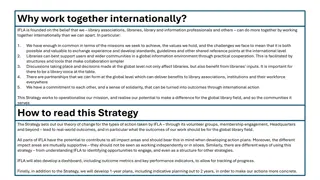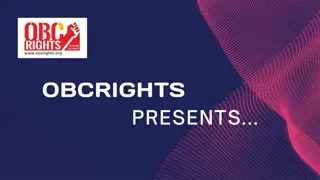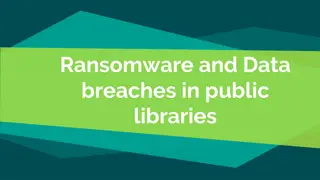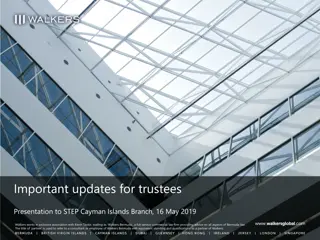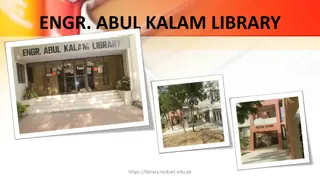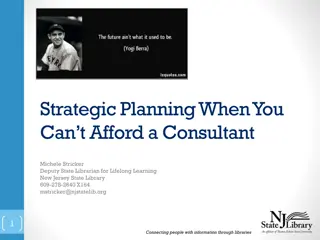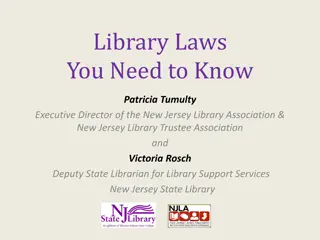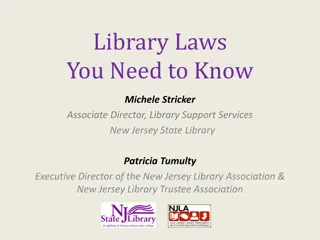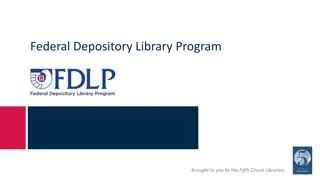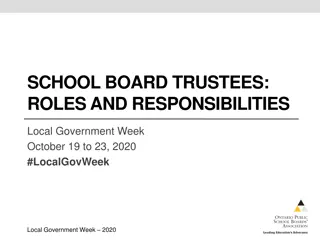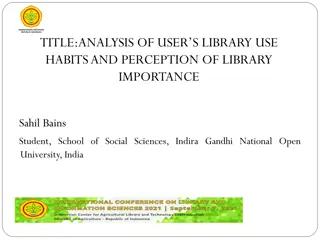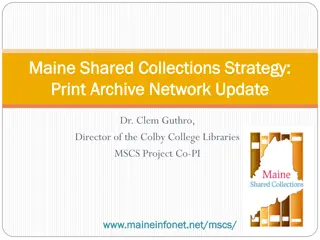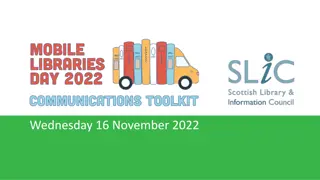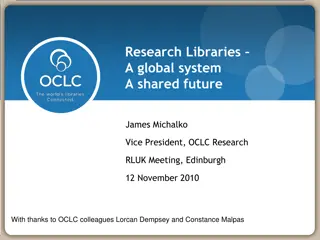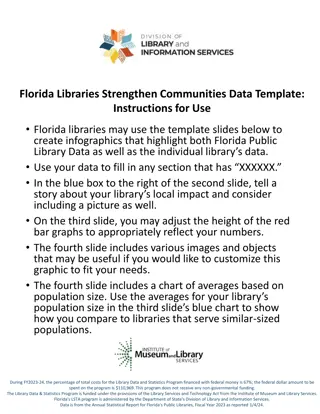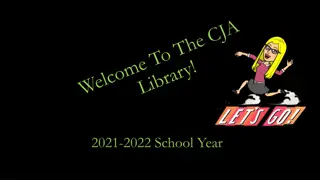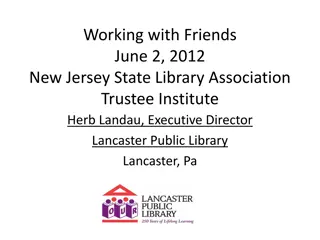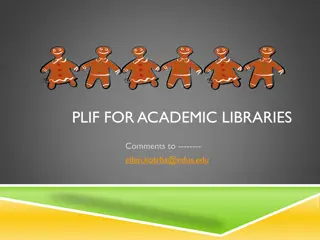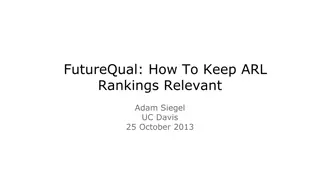United for Libraries: Empowering Library Trustees and Friends
United for Libraries is a division of the American Library Association that supports library trustees, advocates, friends, and foundations in governing, promoting, advocating, and fundraising for libraries. Through training, advocacy resources, networking opportunities, and consulting, United for Libraries empowers its members to create a powerful force for libraries in the 21st century. The organization provides resources such as webcasts, publications, newsletters, and programs to enhance the effectiveness of library governing bodies and ensure successful library operations.
Download Presentation

Please find below an Image/Link to download the presentation.
The content on the website is provided AS IS for your information and personal use only. It may not be sold, licensed, or shared on other websites without obtaining consent from the author.If you encounter any issues during the download, it is possible that the publisher has removed the file from their server.
You are allowed to download the files provided on this website for personal or commercial use, subject to the condition that they are used lawfully. All files are the property of their respective owners.
The content on the website is provided AS IS for your information and personal use only. It may not be sold, licensed, or shared on other websites without obtaining consent from the author.
E N D
Presentation Transcript
About United for Libraries Trustees and Friends 101 Roles & Responsibilities Working Effectively with Your Trustees Troubled Boards Prevention and Survival The Good, the Great and The Unfriendly Short Takes for Trustees & Trustee Academy Additional resources Questions?
United for Libraries: The Association of Library Trustees, Advocates, Friends and Foundations, is a division of the American Library Association with approximately 4,000 personal and group members representing hundreds of thousands of library supporters. United for Libraries supports those who govern, promote, advocate, and fundraise for libraries, and brings together library trustees, advocates, friends, and foundations into a partnership that creates a powerful force for libraries in the 21st century.
-Training (webcasts, publications) -Advocacy resources Library Advocacy) -Networking newsletters, programs at the ALA Annual Conference, PLA, and ALA Midwinter Meeting) -Products and services -Consulting Training for Friends, Foundations, and Trustees Advocacy resources (Power Guide for Successful Networking (email discussion lists, member Products and services (webinars, publications) Consulting (in-person and Skype)
Manager of Marketing & Membership United for Libraries Manager of Marketing & Membership United for Libraries BA, Hollins University Princeton (N.J.) Public Library Easttown (Pa.) Library & Information Center MLIS, Drexel University The Voice for America s Libraries newsletter Conference programming Awards Membership (group and statewide) Webinars and continuing education
Library governing body Sets policies Fiduciary responsibility Hires library director Evaluates library director Strategic planning Advocates for the library Ethical obligations
Board Packet Board Packet Agenda (created by board chair and director) Minutes from prior meeting Director s report Use statistics Budget Service and goal accomplishments Library in the news Library issues for discussion and/or action Policy updates reviews, development Friends/Foundation report
Board Meeting Board Meeting The Director s Report is the time for you to give the back-story What the budget numbers tell you? What trends in use do you see and what does that portend for the future? What issues are impacting your services: Nationally Statewide Locally Invite discussion on what trends mean for library services how can you capture opportunities, meet challenges, or avoid pitfalls? Policy discussion what policy are you discussing/reviewing this month? How well is it serving your staff and community?
Informal communications Informal communications Library in the news announcements Staff announcements (welcome, tributes, goodbyes) Happy / unexpected program results
Lay the foundation of your working relationship Impart library values, mission, and goals Articulate the role of the library Trustee Lay the foundation of your working relationship Impart library values, mission, and goals Articulate the role of the library Trustee Orientation packet Role chart Library policies Staff chart Newsletter List of board members (and contact information) List of Friends and/or Foundation board (and contact information) Board schedule / meeting times Sample agenda Sample board minutes Tour of library Office visit to answer questions and go over packet
Understands and adheres to parliamentary procedure Attends meetings Reads board packets Participates in discussions Joins local, state, and national organizations Understands the importance of values such as intellectual freedom, privacy, and their relationship to democracy and libraries
One person (or clique) is a bully (may be the president). A board member doesn t understand his or her role, and gets involved with management. A board member doesn t trust the expertise of director. A board member has a personal issue or grudge against the director. Board members have different views on what the direction is for the library.
Prevention Communication Be professional Support your staff Planning Comply with policy Get help (within your community, county, state, United for Libraries)
Friends: Friends: Library Director: Shares opportunities and challenges the library will be facing in coming year Provides Friends with a prioritized wish list Attends Friends functions Joins the Friends as a donor (not as an active member) Chief operating officer Library Director: Raise money Advocate and promote the library Work with director in determining how money will be spent Volunteer A separate 501c3 organization
Raise money Friendraising Advocate Programs Link to the community Volunteer Provide insight and input Promote the library s mission
Friendraising vs. fundraising Foundations typically raise larger amounts of money through endowments, planned giving, etc. Some libraries have a merged Friends group/Foundation. Foundations should also have an MOU with the library.
Great Communication It s a two way street. Director attends Friends meetings and invites a Friends liaison to Board Meetings. Mutual Respect The Friends work hard for the money. The director knows best about library priorities. Shaping the Future Friends should be invited to participate in the library s strategic planning process, such as focus groups, surveys, and other engagement opportunities. The director should let the Friends know every year what the library s challenges and opportunities will be.
Develop mutual working documents for operating together in the future: Memorandum of understanding. Library s commitment to supporting Friends. Guidelines for giving. The role of the Friends board.
Friends are secretive and unwilling to share their organizational and financial information with the library. Friends don t invite the library s administration to their meetings. Friends believe that because they raise the money, they should decide how it is spent. Friends are withholding money for which the library has a legitimate need. Friends are opposing library policy and/or direction. Friends are giving their money to organizations or initiatives outside the library. Friends have become more like a club and follow their own agenda vs. that of their mission. Friends officers don t turn over, and they begin to think of the money raised as their own.
Make roles/responsibilities clear. Friends don t make purchasing decisions. Friends don t make or dispute library policy. Friends hold community donations in trust for the library Funds are not theirs to keep/save, or spend on other organizations. Donors want their donations spent on the library, not keeping a checking account richly padded. Outside donations should only happen when library concurs (literacy initiatives, for example).
If they cant support the director and/or library, they are not a Friend. Those who are not supportive need to move on. No one member of the Friends board has more authority than any other member.
Have a facilitated discussion about roles and responsibilities. Come to a written agreement about working together in the future. Keep differences among the players. Get help (from a neutral party, United for Libraries).
The NJSL provides access to Short Takes for Trustees and the Trustee Academy to Trustees, directors, and library staff. Short Takes for Trustees watching together at board meetings to stimulate discussion. Short Takes for Trustees: 10 brief videos (8-10 minutes) ideal for Trustee Academy Trustee Competencies Working Effectively with the Library Director The Library s Budget for Trustees Standing Up for Intellectual Freedom Everyday Advocacy - Why the Library Matters! http://www.ala.org/united/training/newjersey Login: nj-short-takes Password: gardenstate Trustee Academy: Five in-depth webinars on:
Troubled Library Boards: Prevention and Survival With Friends Like These Merging a Friends and Foundation Engaging Today s Volunteers for Libraries and Friends (three-part series) How to Start a Friends Group (free) Working Effectively with Your Library Trustees (free for members)
The Complete Library Trustee Handbook The Good, the Great, and the Unfriendly: A Librarian s Guide to Working with Friends Groups 101+ Great Ideas for Libraries and Friends (free with membership) Even More Great Ideas for Libraries and Friends (free with membership)
Subscription to The Voice for Americas Libraries Four digital publications, including 101+ Great Ideas for Libraries and Friends Even More Great Ideas for Libraries and Friends More than 30 Fact Sheets for Friends & Foundations Nine in-depth toolkits. Free and discounted webinars. Eligibility for grants and awards. Discounts & special offers. And much more!
Jillian Wentworth Manager of Marketing & Membership jwentworth@ala.org www.ala.org/united united@ala.org (800) 545-2433, ext. 2161


